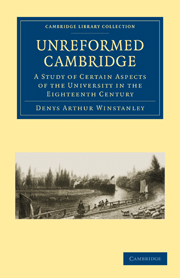CHAPTER IV - THE COLLEGES
Published online by Cambridge University Press: 07 September 2010
Summary
The colleges of Cambridge are justly proud of their past, and can claim to have been the nurseries of great scholars and famous statesmen. But they have not always been true to their noble traditions, and in the eighteenth century they deserved far more criticism than they received. The omission has been made good by posterity which has meted out censure with an unsparing hand; but the condemnation, though deserved, might with advantage have been less sweeping. It is true that the colleges had fallen from their former high estate, and were no longer adequately fulfilling many of the functions for which they had been established: duties were neglected, statutes broken, and learning left with a handful of devotees. But never in their greatest degradation were they quite so lost to shame as they are sometimes represented to have been; and, if they are to be pictured as they really were, the few grains of wheat must be sifted from the great mass of chaff. Nor is this only a demand of justice. Their recovery in the nineteenth century becomes much more intelligible when the simple truth is grasped that they never were completely corrupt.
Throughout the greater part of the eighteenth century the largest college in the University was St John's, but it was not so large as it once had been or was later to become. The average number of its annual admissions during the first twenty years of the century was slightly over fifty, but from then it begins steadily to decline: for the years 1761 to 1765 it was as low as twenty-nine.
- Type
- Chapter
- Information
- Unreformed CambridgeA Study of Certain Aspects of the University in the Eighteenth Century, pp. 183 - 296Publisher: Cambridge University PressPrint publication year: 2009First published in: 1935



